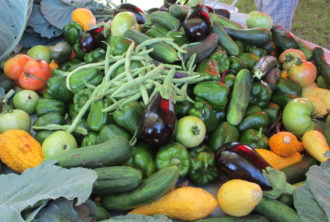From November 2013 through November 2014, the Friends of the Farmers Market completed the Montgomery County Farm to Community Planning Project, a food system assessment that specifically sought to identify opportunities to foster growth in local agriculture in ways that are inclusive to the low-income population. The results were simultaneously predictable and surprising.
From the consumer end, an in-person survey of fifty low-income consumers indicated that the vast majority buy fresh produce through mainstream food venues, such as chain grocery stores. Although convenience was listed as the number one reason why they shopped there, quality came in second. They care about the condition of their produce. Additionally, nearly three-quarters of participants agreed or strongly agreed with the statement “I know how to grow my own food,” reflecting the agricultural heritage of the sample and of the region. However, focus groups revealed that the reason why so few survey participants gardened at home was because of rental situations and prohibitions from landlords. The vast majority of those surveyed believed having a community garden and/or farmers market in their neighborhood would result in them eating healthier. Finally, while only sixteen percent were interested in starting their own food-based businesses, most people believed that a food business incubator and community kitchen would be beneficial to their community.
From the producer side of the food system, expansion is on the minds of area producers. Seventy-six percent of those surveyed desired to expand their operations, focusing on direct, restaurant, and then institutional buyers. Those producers cited land and labor access, transport cost or type, and marketing as top barriers to doing so. Training programs regarding business planning, lending and grants, and marketing were listed as needs. During focus groups and interviews, an aggregation and distribution hub was commonly suggested, as producers were also keenly aware of the major barrier cited by local food stores and restaurants in selling local produce: communication between buyers and producers. Independent grocery stores were found to be the current option for producers, though large chain groceries were not opposed to selling local, but extremely concerned with keeping up with demand and organizing logistics between individual producers.
This report was presented to a community forum of 56 stakeholders, including farmers, low-income community members, community organization representatives, Virginia Tech faculty, and Virginia Tech students. During this forum, the most salient issues were identified and used to guide the formation of working groups, which will continue to work on potential solutions also identified.
We can conclude from this assessment and forum that the primary means of linking low-income consumers and local-producers is currently through mainstream food venues. However, the producers in the area are finding barriers to scaling up and to communicating with buyers. A food hub or farmer cooperative may ameliorate these issues of scale and marketing. Community gardens would be welcomed by residents and may help to increase the amount of produce consumed and foster entrepreneurship around agriculture that is already a part of the region's heritage. A food business incubator may help to channel this in ways that will encourage creativity and collaboration between producers, entrepreneurs, and food venues.
Want more information? See the related SARE grant:
This material is based upon work that is supported by the National Institute of Food and Agriculture, U.S. Department of Agriculture through the Sustainable Agriculture Research and Education (SARE) program. Any opinions, findings, conclusions, or recommendations expressed in this publication are those of the author(s) and should not be construed to represent any official USDA or U.S. Government determination or policy.
